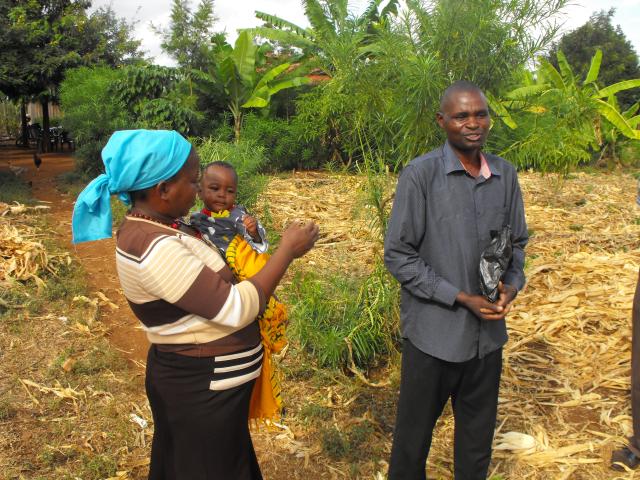Church and farm partnerships help share best practices and collaborative work relationships.

Seventeen people from across The United Church of Canada participated in the Mission & Service Global Pilgrimage to Kenya, from March 25 to April 4, 2017. The pilgrimage visited Mission & Service partners throughout the region. This series of blog posts shares the story of their journey.
This is our third day visiting communities in the Meru region and learning about conservation agriculture with Mission & Service partner, the National Council of Churches of Kenya (NCCK). Our morning started with debrief meeting with NCCK representatives; Nora, Shadrack, Jennifer, Paul & Daniel.
Structure
The conservation agriculture model uses minimal tilling, mulching, crop rotation combined with water harvesting/management towards an ultimate goal of local food security.
NCCK works with the National Drought Management Agency (NDMA) and advises them of needs in drought stricken areas. The NDMA then reports to the national government where help is needed. The Kenya Agricultural & Livestock Research Organization (KALRO) is doing trials and experiments on technologies in partnership with NCCK to determine best varieties of drought tolerant maize & legumes suitable for growing in parts of Meru, Tharaka Nithi, Embu, and Kitui counties. The NCCK/KALRO partnership started as a result of Mission & Service support of conservation agriculture. Now they share best practices and enjoy a collaborative work relationship.
Comments
It was evident that agronomists who live in the community are highly respected by the farmers and deeply passionate about their work. The agronomist and local pastor Rev. John are trusted advisors and amplify the voices of the people.
Lead farmers go on exchange/exposure visits to other regions and return to share learnings with other farmers. Farming practices learned are put into practice on their farms.
Farmers are appreciative of the Mission & Service support from the United Church and welcomed our visit. Paul shared that our visit will encourage them to want to do more. He indicated “Your coming has brought a new character of hope to our people and a big encouragement. What you did here will forever be remembered by the farmers.” These were very touching and powerful words! We carry the responsibility to share what we saw and heard and to accurately portray their goals and challenges to our brothers and sisters in Canada Paul thanked us again for engaging with all of them and asked for us to pass along all of their regards to our people in Canada.
The meeting ended with us all holding hands in a circle joined in prayer. I shared the United Church Women closing meeting prayer "May the Lord watch between me and thee while we are absent one from the other."
We took a group photo outside the Westwind Hotel and travelled on a different route back to Nairobi. We passed through high altitude coffee growing region in Meru. This is a very rich growing region and despite the drought was still green. The highway was quite good but many speed bumps in villages along the way. There were some spectacular views from the mountains. As we travelled down the mountain we saw small tea plantations on hillsides. Passing through Chuka we saw a large university campus. Next we reached Embu, a wealthy area where provincial government headquarters are. Our driver Geri wanted to stop and purchase fruit in a town where prices were very good; mangoes 5 for 100 shillings which is equivalent to $1.00 USD. Lower in the valley we saw a rice growing region. We arrived at the Desmund Tutu Conference Centre guest house that evening.
Personal reflection
What resonated most with me on this field trip is that democracy is young in Kenya. It is encouraging to know that the farmers who were once dismissed now have their voices amplified through the agronomists working with them at the grassroots level. There is still much work to be done.
—Jill Bates, Bay of Quinte Conference